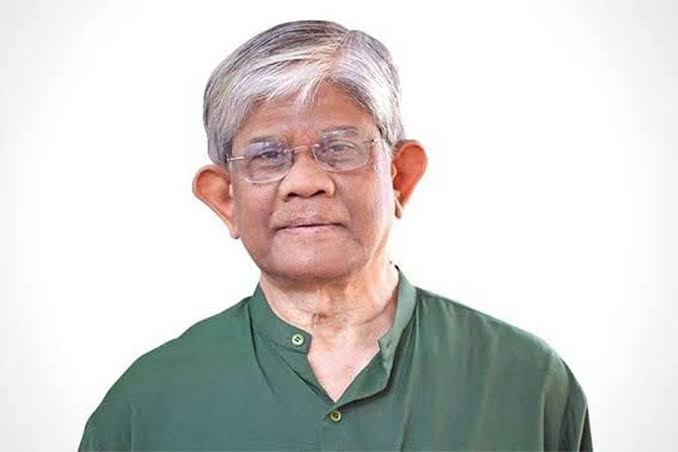IMF asked about national election before disbursing loan tranches, says finance adviser


The International Monetary Fund (IMF) asked about the date of the national election in Bangladesh before releasing the fourth and fifth tranches of its loan, says Finance Adviser Salehuddin Ahmed.
After a meeting of the Advisory Committee on Government Purchase on Wednesday, he said budget support from international financial institutions began to come in after a possible date for the parliamentary polls was announced, bdnews24.com reports.
Around midnight on Monday Bangladesh time, the IMF's executive board approved the long-delayed fourth and fifth tranches of the loan. Bangladesh is receiving nearly $1.34 billion from the tranches of the $4.7 billion loan programme this month.
The IMF last released $1.15 billion in the third tranche in June 2024. Combined, the first three tranches provided $2.31 billion in loans to Bangladesh.
The fourth tranche was scheduled to be delivered in December. But as police and economic instability gripped the country, compounded by worries over foreign exchange reserves, following the fall of the Awami League government, the international lender stopped providing loans citing unmet conditions.
The IMF did not approve the loan tranches to Bangladesh following two board meetings in February and March. There was no change after discussions in April either. Later, the government said that foreign exchange reserves had begun to turn around without the loan.
They said that, as a result, the loan was no longer needed.
On Wednesday, regarding the IMF loan, the finance adviser said: "Everyone, including the IMF, is satisfied that an election date has been announced. The IMF asked me whether the election will be held in February or not. They are wondering about it. We did tell them that it will [be held in February].
“Recently, the World Bank, ADB (Asian Development Bank), AFD (Agence Française de Développement), and AIIB (Asia Infrastructure Development Bank) have approved loans. Everyone is generally satisfied with the progress of the reform work in Bangladesh.”
The finance adviser said, "Wheat was purchased in the procurement committee meeting. Fortunately, the price of wheat has come down. This purchase will save Tk 180-200 million. The war in the Strait of Hormuz has not had any impact. There have been savings in purchasing fuel even during the war.
“The price point prior to the war has come down after the war ended. Immediately, we issued a tender and got a price of $5-10 lower. There have been savings of about Tk 700-800 million. This is a credit to the Ministry of Energy. The price of fertiliser from Morocco and Tunisia has also increased slightly. There was no way out here."
Regarding the food situation in the country, he said: "The reserves of rice and wheat are still satisfactory. Still, we have asked for the import of 50,000 tonnes of wheat so that there is no shortage of food."
“Foreign investment is a little lagging. But for various reasons, especially due to budget support, foreign exchange reserves have increased. Besides, exports are now fairly good.
“Remittances are coming in well. When I went to Saudi Arabia, I found out that ordinary citizens are sending money just because we have come in. Before that, they were not comfortable sending money. They were uncomfortable about where the money they sent had gone and what happened to it.”
The meeting approved the purchase of 40,000 tonnes of MOP fertiliser from the Canadian Corporation, 25,000 tonnes of TSP from Groupe Chemique Tunisia, and 40,000 tonnes of DAP fertiliser from OCP Nutricrops Morocco. MOP fertiliser was purchased at $342 per tonne, TSP fertiliser at $550 per tonne, and DAP fertiliser at $710 per tonne.
The committee approved the proposal to purchase 25,000 tonnes of gasoline (octane) in June. The premium price per barrel was calculated at $5.93 and the reference price was $73.61. This will cost a total of Tk 2.08 billion. Indonesia's Bumi Siak Pusak Japin (BSP) will supply the oil.
In addition, a cargo of LNG is being purchased from the international market. This LNG will arrive from Vittal Asia Singapore at $13.52 per unit on Jul 28-29. The total cost will be Tk 5.69 billion.
The meeting approved the names of suppliers authorised to buy fuel from different countries from July to December according to premium and reference prices. The total cost is estimated at Tk 100.66 billion.
Seven companies are acting as suppliers. They are PTT Thailand, ENOC Arab Emirates, PetroChina, BSP Indonesia, PTLCL Malaysia, Unipay China and IOCL India.
The meeting approved a proposal to buy 50,000 tonnes of wheat from Dubai Cereal Crop Trading. At $275 per tonne, the total cost is nearly Tk 1.69 billion.


 For all latest news, follow The Financial Express Google News channel.
For all latest news, follow The Financial Express Google News channel.